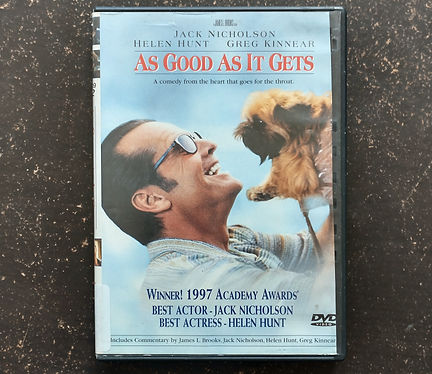
As Good As It Gets-James L. Brooks
It is always interesting to see how writers are depicted on screen. The natural commonalities I've organically slipped into—which must be more common than I believed them to be unique—and the chasm of differences between myself and what others seem to feel is a pre-requisite of the trade. Misery, Finding Forrester, Sideways, Barton Fink, and Factotum are a few that stick out from the muck of memory banks that I have seen. Each presented a unique case of the day-to-day trials and hurtles that present themselves to those who practice the craft. Of all the characters with relatable attributes, I find myself in limbo between Paul Sheldon (Misery) and Henry Chinaski. However, I lean more towards Sheldon. So far as what I liked were the accurate depictions of both Paul and Henry as ordinary Joe's bereft of the superhuman genius trait that—for reasons which elude me—seem to be misapplied to writers. As well as the other misperceived pre-requisite that all writers must be eccentric or always teetering on the edge of a nervous breakdown, and the only antidote available is to live life as a shut-in recluse who develops a calloused heart and adopts a pessimistic view of society, or, is constantly losing a battle with self-security. Miles, Melvin, and Barton Fink fit the bill of these characters, and Jamal Wallace as the diamond in the ghetto rough. Since picking up the proverbial pen to make a run at a living through words, I've found that one of the most helpful attributes is developing a high tolerance for solitude. But, for me, when I am alone at my computer for copious amounts of time, I never feel as if I am alone and find it rather cathartic and relaxing with a tremendous sense of fulfillment after a draft. Even a review such as this one. What I have never felt nor experienced over the past four years is a contemptuous view of people/society. I look forward to social gatherings, even if they happen to be with strangers at the grocery store or a passersby on the sidewalk. It almost serves itself as a treat. That is not to say that some writers can be a finicky bunch. I know J.D. Sallinger was the catalyst for a reclusive and mysterious author and that Thomas Harris felt his accompanied fame with his success was rather burdensome. But then there are other writers like Ernest Hemingway who were social butterflies and didn't mind having a few too many cocktails with friends once the days' work was done. Jack Nicholson's character of Melvin in As Good As It Gets, an uncouth, disrespectful, anti-social, and successful writer held at the mercy of his outrageous hypochondria and OCD felt like a wild exaggeration of so many elements that are inaccurate of most writers. And what I found to be most outrageous was the fact that he was written as a romance novelist. Really? I would like to think that if your number one top-sellers are based upon the category of romance, the writers in question would have at least some semblance of manners, joie de vivre, social graces, and the ability to converse with women. Melvin had absolutely none of these qualities. One of the sharpest tools in a writer's shed is the ability to perceive. To pick up on the little quirks—both spoken and unspoken—in the human language that we use to communicate with one another and deposit these nuggets in our mental bank until they fit a character we create for a story. Now, how is Melvin supposed to believably be able to acquire such information if every woman he comes into contact with wants nothing but distance? Shouldn't a romance novel be able to penetrate the soul and unearth feelings we never had experienced before? And doesn't this seem to require a skill level of observation that seems almost ethereal to the general public? Anyway, I just didn't buy Melvin as having this skill and the rest of the film was rather mundane for me as the plot went along. I don't care for straight people playing gay characters when there is a plethora of people in Hollywood who eat sleep live and breathe this lifestyle daily and here Greg Kinnear and Cuba Gooding Jr. both put on their flair pants and did the gay community a disservice with poor imitations. Melvin was completely intolerable, and, I felt, that in real life, no matter how much money he threw at both Carol (Helen Hunt) and Simon (Greg Kinnear) it still wouldn't be enough to purchase their friendship for all the vile and bigoted things he said. And once you reach that plateau of misanthropic living, especially at that stage of your life—the twilight years—it takes more than a puppy dog and some quality time within a 72-hour time frame to unravel. The age gap between Carol and Melvin was ridiculous and asking us as the audience to believe that they would fall in love completely abandoned any sense of reason. I get it, Hollywood, Jack Nicholson is a heavyweight. But that doesn't cut any mustard in the sphere of verisimilitude. And just like Bill Murray would never get with Scarlett Johanssen, Gary Cooper couldn't bag Audrey Hepburn, and none of those Playboy models found anything besides his money attractive about Hugh Hefner, so too did I find the unforeseen romantic tryst between geriatric malignant Melvin and lovingkindness Carol completely ludicrous. Why Hollywood continues to push this laughable trope after 60+ years is beyond me. But the general public seems not to mind, so I guess that's the answer. The movie-going public and critics may have loved this quirky little romance-comedy, but I did not care for it in the slightest.
Stars: *
Verdict: Skip
Cousins: Love In The Afternoon, Autumn In New York, Blue Car, Manhattan